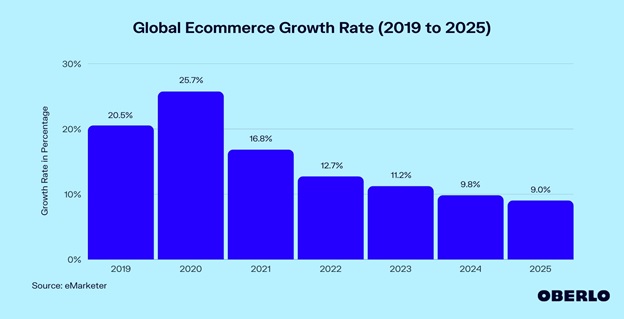How Django Development can Send Businesses Online Quickly
We’re living in an age where our customers are moving online at a considerable pace. In fact, as the Covid-19 pandemic paved the way for global lockdowns and social distancing measures, online sales worldwide accelerated to nearly $4 trillion in 2020.
According to McKinsey research, the online shopping habits of consumers have fundamentally changed forever. This means that your customers have taken so well to transitioning into online shopping that they plan to continue to make purchases in cyberspace long into the future.
This means that businesses will need to revise their position on online shopping and marketing. Today, more so than ever before, your website is the face of your company – and this means that you need a Content Management System (CMS) that can provide the best experience for your customers.
As we can see from the chart above, global eCommerce grew at a huge rate of 25.7% in 2020 due to the Covid-19 pandemic, and although these rates are set to slow down in the coming years, even the 9% growth in 2025 represents a massive step in industry expansion.
For many small businesses and startups, it may be a daunting task to build a strong online presence, but by using the right web development tools, the process can be streamlined.
With this in mind, let’s take a moment to look at Django, one of the most popular Python web development frameworks in existence today, and how they can help businesses of all sizes to simplify their online presence.
What is Django?
Although the name may conjure images of a blood thirsty Tarantino classic, Django has been popularly known as a Python framework for web development since the mid-2000s. First created in 2003 by Adrian Holovaty and Simon Willison – both of whom used Python whilst working for Lawrence Journal-World newspaper, Django was first released in 2005.
The Python programming language has become arguably the most popular worldwide for web developers over recent years, and Django works to adapt Python’s features to work with projects that it wasn’t specifically designed for.
In a nutshell, Django augments the application of Python to make it straightforward to build your website or web apps.
Naturally, the Django framework is written in Python, and it’s possible to use Django for web development. The aim of Django is to make web development far easier and more efficient for its users.
Alongside a platform for web development, users also get a wide range of open-source libraries and ready-to-go solutions.
This means that Django can be an advantageous tool for small businesses that are intent on ramping up their online presence, and building functional websites to reach their customers digitally.
Creating a Custom Website to Suit your Customers
Custom made websites can be an excellent way of ensuring that your business can stand out from the fierce competition online and to appeal to customers in ways that can’t be replicated elsewhere online.
There can be many approaches to building a custom made website, and programs like Python, PHP, Nodejs, and ASP.
They can all help to create fully functional pages that have the potential to appeal to your audience.
However, for sheer convenience and simplicity, running a Django-based eCommerce framework can be an excellent choice for users.
In recent years, Python has become a hit among programmers. Python is an Object-Oriented Programming Language that focuses on Rapid Action Development (RAD).
This means that Python embeds a back-end language that can help to combine a website’s front-end and back-end to build an entire website in an easy-to-manage manner.
Statista data suggests that, based on the PYPL-Index which analyses Google search trends for programming language tutorials.
Python ranks first as the most popular programming language today.
Python’s adaptability, versatility, readability, high efficiency, and simple syntax have made it a popular solution for eCommerce businesses.
The tool also works well in facilitating more complex tasks on the back-end whilst accelerating website development through a large range of libraries.
Django’s simplicity and compatibility with Python means that it can be easy for businesses to pick up Django development services which can not only pave the way for functional, time-effective, and efficient eCommerce websites.
But also help to incorporate tutorials for staff members within their suite of services to enable changes to be made on the fly in-house.
The Best Choice for Scalability
Although we’ve looked at how Django can benefit small businesses and startups.
It’s important to note that some of the biggest websites around the world are dependent on Django’s ability to seamlessly scale to meet heavy flows of traffic.
As opposed to development time, hardware is cheap, and this means that Django can scale effortlessly alongside any hardware you’re ready to use alongside it.
Furthermore, Django uses a “shared-nothing” architecture, which means hardware can be added at any stage.
It can offer various functions such as server coverage for databases, caching, or web applications.
As digital transformation is scheduled to continue to grow, there’s no better way of creating a unique website online for your business.
Than to adopt both Python and Django as a framework to build on.
Not only can developers help to bring your ideas to life, but the easy-to-pick-up management tools means that your team can learn to make changes.
And improvements to your pages with little time-constraints involved.
Making Django an ideal solution for any business with one eye on a digital future.
Related posts
Recent Posts
Decathlon MBD Mall J – Complete Guide
About Decathlon Decathlon is more than just a brand name. It’s a real story, a human adventure that began in…
GameStop Near Me Rhode Island, United States
GameStop Near Me Rhode Island, United States – Gamestop is the best place for game lovers; Its headquarters are in…



